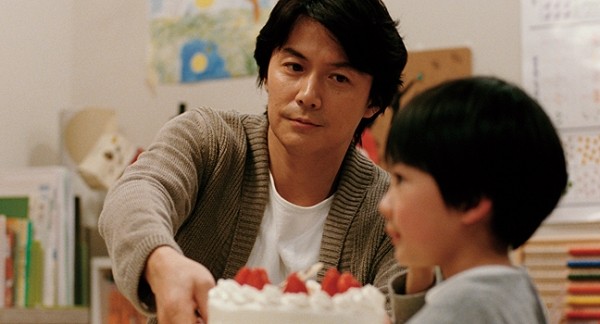Like Father, Like Son
Trading children becomes too matter-of-fact in Like Father, Like Son
By Scott Renshaw @scottrenshawIt is one of my cherished critical principles: You must grant a movie its premise. Maybe you’re being asked to believe in a series of tests that allows a sinister agency to predict someone’s every move, or that a bunch of scared kids might keep recording a terrifying ordeal while lost in the woods. But arms-folded incredulity is the enemy of fully engaging in cinema as a way to explore experience beyond your own narrow definition of how the world should work, or how you would react to any given situation.
And then there’s something like Hirokazu Koreeda’s Like Father, Like Son, which left me at such a cultural distance that it was almost impossible to recover. How could I embrace a film that accepted as a reasonable premise something that violated every instinct I have as a parent?
That setup involves a Japanese couple—Ryota (Masaharu Fukuyama) and Midori Nonomiya (Machiko Ono)—with a 6-year-old son, Keita (Keita Ninomiya), who receive a troubling call from the hospital where Keita was delivered. It turns out that another boy who was delivered there turned out not to be the biological son of the parents who were raising him—and that means Keita might have been switched at birth. When the Nonomiyas discover that this switch did in fact take place—and that their biological son, Ryusei (Shôgen Hwang), is being raised by another couple (Yoko Maki and Riri Furanki)—they’re faced with a decision: Do they continue with life as it has been? Or do they swap Keita with Ryusei so they can be reunited with the blood of their blood?
And are you actually being serious with me right now?
In fairness to Koreeda, he works hard at making Ryota’s psychology in particular feel plausible. A high-achieving architect, he sees Keita’s mere adequacy at the piano as an example of some moral failing; when he learns that Ketia’s not his biological son, it feels like an explanation he can live with. The childbirth complications that left Midori unable to have any more children makes this revelation feel to Ryota like his only chance to have the perfect son he imagines possible. And Koreeda shows some of Ryota’s complicated relationship with his own father, albeit at times through the use of too on-the-nose dialogue.
Yet that emphasis on Ryota’s perspective—and on a character arc that sticks perilously close to the “workaholic learns what really matters in life” notion that has fueled a hundred cookie-cutter Hollywood fantasy-comedies—still seems to take it far too much for granted that all the other principal parties will be just fine with surrendering children they’ve raised for six years. Midori frets but clearly defers to Ryota in what may be a culturally accurate example of deference, but Ryusei’s parents are just as passive, seemingly willing to go along with whatever plan Ryota decides is necessary. Nothing about this situation seems to feel genuinely wrenching or agonizing to these parents, even as they dabble in legal action against the hospital. It’s all just a contrivance to help Ryota become A Better Person™.
Maybe point of view is ultimately the problem here. Koreeda has proven remarkably adept in previous features like Nobody Knows and I Wish at capturing the inner lives of children in tumultuous family situations, and the best moments in Like Father, Like Son show Keita and Ryusei reacting to their transition from one family to the other, or unable, like Ryusei, to stop asking “why?” about this incomprehensible change in their lives. It’s easy to imagine a compelling drama about this scenario from the perspective of the children—from the guilt of actually preferring your new parents to those who raised you to the anguish of feeling abandoned.
Koreeda, unfortunately, clings to the story of one stolid man treating the exchange of one son for another as a simple, logical business transaction—and it simply becomes too much of a psychic road block to overcome. Like Father, Like Son ultimately isn’t all that interested in what defines the parental bond. If the matter-of-fact behavior of everyone involved here makes sense in Japan, something has most decidedly been lost in translation.
LIKE FATHER, LIKE SON
Masaharu Fukuyama, Machiko Ono, Keita Ninomiya
Not Rated
Twitter: @ScottRenshaw
Speaking of ,
-
Drinking-Class Zero
Following a night of drinking, Wendy Simpson, 25, walked to a McDonald’s restaurant in West Yorkshire, England, where she was told that the counter was closed and only the drive-through was open but that she couldn’t be served
- Jun 16, 2014
-
Walk of Shame, The Lego Movie
New DVD/VOD Tuesday, June 17
- Jun 16, 2014
-
How to Train Your Dragon 2
Dragon 2 shows DreamWorks is still willing to be daring
- Jun 13, 2014
- More »
More by Scott Renshaw
-
Film Reviews: New Releases for April 19
The Ministry of Ungentlemanly Warfare, Abigail, The Beast, Hard Miles, Sasquatch Sunset and more
- Apr 19, 2024
-
Faces of Salt Lake County book and portrait reception
Images and personal stories in a new book reveal local demographic diversity
- Apr 17, 2024
-
Feature film review: THE BEAST
A filmmaker's compelling ideas get a bit tangled in references to his creative influences.
- Apr 17, 2024
- More »
Latest in Film Reviews
Readers also liked…
-
Power Plays
Two satirical comedies explore manipulations and self-delusions by those with power.
- Aug 31, 2022




